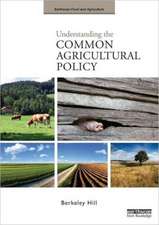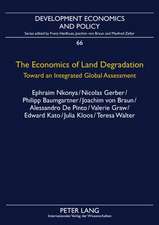Marginality: Addressing the Nexus of Poverty, Exclusion and Ecology
Editat de Joachim von Braun, Franz W. Gatzweileren Limba Engleză Hardback – 29 aug 2013
| Toate formatele și edițiile | Preț | Express |
|---|---|---|
| Paperback (1) | 427.71 lei 6-8 săpt. | |
| SPRINGER NETHERLANDS – 29 aug 2015 | 427.71 lei 6-8 săpt. | |
| Hardback (1) | 442.51 lei 6-8 săpt. | |
| SPRINGER NETHERLANDS – 29 aug 2013 | 442.51 lei 6-8 săpt. |
Preț: 442.51 lei
Nou
Puncte Express: 664
Preț estimativ în valută:
84.70€ • 92.04$ • 71.19£
84.70€ • 92.04$ • 71.19£
Carte tipărită la comandă
Livrare economică 21 aprilie-05 mai
Preluare comenzi: 021 569.72.76
Specificații
ISBN-13: 9789400770607
ISBN-10: 940077060X
Pagini: 350
Ilustrații: XVII, 389 p.
Dimensiuni: 155 x 235 x 22 mm
Greutate: 0.92 kg
Ediția:2014
Editura: SPRINGER NETHERLANDS
Colecția Springer
Locul publicării:Dordrecht, Netherlands
ISBN-10: 940077060X
Pagini: 350
Ilustrații: XVII, 389 p.
Dimensiuni: 155 x 235 x 22 mm
Greutate: 0.92 kg
Ediția:2014
Editura: SPRINGER NETHERLANDS
Colecția Springer
Locul publicării:Dordrecht, Netherlands
Public țintă
ResearchCuprins
1 Marginality—An Overview and Implications for Policy.- Part 1 Concepts and Theory.- 2 Marginality—A Framework for Analyzing Causal Complexities of Poverty.- 3 Exclusion and Initiatives to “Include”: Revisiting Basic Economics to Guide Development Practice.- 4 Marginality from a Socio-ecological Perspective.- Part 2 Dimensions and Prevalence of Marginality.- 5 Mapping Marginality Hotspots.- 6 The Poorest: Who and Where They Are.- 7 Targeting the Poorest and Most Vulnerable: Examples from Bangladesh.- 8 Correlates of Extreme Poverty in Rural Ethiopia.- 9 Examining the Circle of Attachment, Trauma, Shame, and Marginalization: the Unheard Voices of Young Kutchi Girls.- Part 3 Environmental Drivers of Marginality.- 10 Poverty, Agriculture and the Environment: the Case of Sub-Saharan Africa.- 11 The Marginal Poor and their Dependence on Ecosystem Services: Evidence from South Asia and Sub-Saharan Africa.- 12 Land Degradation, Poverty, and Marginality.- Part 4 Experiencing Marginalityin Africa and Asia.- 13 Tackling Social Exclusion and Marginality for Poverty Reduction: Indian Experiences.- 14 Consumption Behavior of the Poorest and Policy Implications in Indonesia.- 15 Addressing Extreme Poverty and Marginality: Experiences in Rural China.- 16 Experiences in Targeting the Poorest: a Case Study from Bangladesh.- 17 Rural Poverty and Marginalization in Ethiopia: a Review of Development Interventions.- Part 5 Responses to Marginality at Different Levels: State, Business, and Community.- 18 Macro, Fiscal, and Decentralization Options to Address Marginality and Reach the Extremely Poor.- 19 Social Protection, Marginality, and Extreme Poverty: Just Give Money to the Poor.- 20 Innovative Business Approaches for the Reduction of Extreme Poverty and Marginality.- 21 Business Initiatives that Overcome Rural Poverty and Marginality Through Creating Shared Value.- 22 The Marginalized and Poorest in Different Communities and Settings of Ethiopia.
Notă biografică
Joachim von Braun is an economist, with a Doctoral degree in agricultural economics from University of Göttingen, Germany. He joined ZEF as Professor and Director of the Department for Economic and Technological Change in December 2009. He was also Director at ZEF during its foundation phase 1997-2002. Before returning to ZEF, von Braun was Director General of the International Food Policy Research Institute (IFPRI) based in Washington, DC, U.S.A. 2002 to 2009. von Braun also has been Professor for Food Economics and Policy at Kiel University, Germany. His research addresses international development economics topics, incl. markets and trade; poverty; health and nutrition; science and technology.
Textul de pe ultima copertă
This volume presents new insights on marginality, i.e. the situation of people living on the edge of socio-economic and ecological systems. The marginality concept leads to different development policies. While the prevalence of poverty declined by about 50 percent in the past two decades, any further reduction of poverty will be more difficult, because of high diversity of extremely poor people, and complex interrelations between poverty, exclusion and ecology. The marginality concept provides guidance to address this issue. Marginality entails addressing the structural forces of poverty, such as exclusion, discrimination and ecological degradations which lead to vulnerability of the poor. In this volume economists, ecology experts, geographers, agronomists, sociologist, and business experts come together to address marginality. The inter-disciplinary research offers conceptual innovations and presents the dimensions of marginality in developing countries. Economic, political, and environmental drivers are assessed and mapped globally and in detail for countries in Africa and Asia, especially Ethiopia, India, Bangladesh, China, Indonesia. Economic growth especially in rural areas remains and farming communities is central to poverty reduction but needs to be complemented with specific actions to reach those at the margins. The social policy actions and measures to end exclusions are highlighted, and the roles of the state, local government, business and community in them are pointed out for overcoming marginality.
Caracteristici
To explain, conceptualize, and highlight marginality as a root cause of poverty and deprivation Exemplify analytical approaches to the study of “Marginality” at different scales (global, national, local) for students and advanced researchers Facilitate action of public and private players to overcome marginality for reduction of extreme poverty? Includes supplementary material: sn.pub/extras






















